Related Research Articles

William Lewis Cabell was an American engineer, lawyer, businessman, and politician who served as the 14th, 16th and 20th mayor of Dallas. Prior to that, he was a senior officer of the Confederate States Army who commanded infantry in the Western and Trans-Mississippi theaters of the American Civil War.
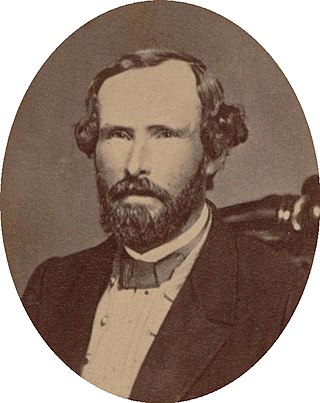
George Wythe Randolph was a Virginia lawyer, planter, politician and Confederate general. After representing the City of Richmond during the Virginia Secession Convention in 1861, during eight months in 1862 he was the Confederate States Secretary of War during the American Civil War, then served in the Virginia Senate representing the City of Richmond until the war's end.

In the context of the American Civil War (1861–65), the border states were slave states that did not secede from the Union. They were Delaware, Maryland, Kentucky, and Missouri, and after 1863, the new state of West Virginia. To their north they bordered free states of the Union and all but Delaware bordered slave states of the Confederacy to their south.

John McAllister Schofield was an American soldier who held major commands during the American Civil War. He was appointed U.S. Secretary of War (1868–1869) under President Andrew Johnson and later served as Commanding General of the United States Army (1888–1895).

Stephen Benton Elkins was an American industrialist and politician. He served as the Secretary of War between 1891 and 1893. He served in the United States Congress as a Delegate from the Territory of New Mexico and a Senator from West Virginia.
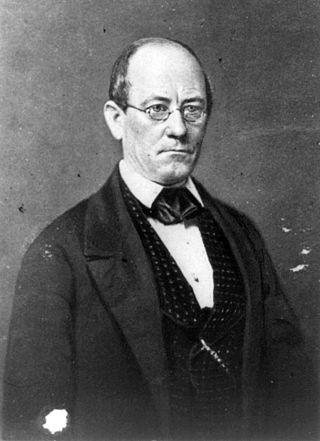
John Letcher was an American lawyer, journalist, and politician. He served as a Representative in the United States Congress, was the 34th Governor of Virginia during the American Civil War, and later served in the Virginia General Assembly. He was also active on the Board of Visitors of Virginia Military Institute.

John Sergeant was an American politician who represented Pennsylvania in the United States House of Representatives. He was the National Republican Party's vice presidential nominee in the 1832 presidential election, serving on a ticket with Senator Henry Clay.

William "Extra Billy" Smith was a lawyer, congressman, the 30th and 35th Governor of Virginia, and a major general in the Confederate States Army during the American Civil War. On his appointment in January 1863, at 65, Smith was the oldest Confederate general to hold field command in the war.
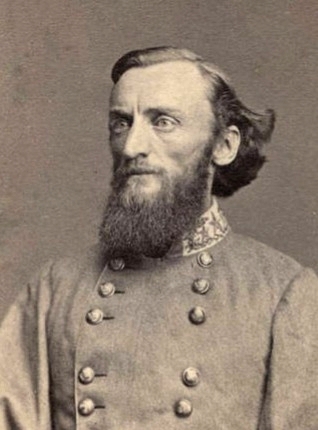
John Sappington Marmaduke was an American politician and soldier. He was the 25th governor of Missouri from 1885 until he died in 1887. During the American Civil War, he was a senior officer of the Confederate States Army who commanded cavalry in the Trans-Mississippi Theater.

The Lee family of the United States is a historically significant Virginia and Maryland political family, whose many prominent members are known for their accomplishments in politics and the military. The family became prominent in colonial British America when Richard Lee I immigrated to Colonial Virginia in 1639 and made his fortune in tobacco.

William Segar Archer was a slave owner, politician, planter and lawyer from Amelia County, Virginia who served several times in the Virginia House of Delegates, as well as in the United States House of Representatives and the United States Senate.

John Randolph Tucker was an American lawyer, author, and politician from Virginia. From a distinguished family, he was elected Virginia's attorney general in 1857 and after re-election served during the American Civil War. After a pardon and Congressional Reconstruction, Tucker was elected as U.S. Congressman (1875-1887), and later served as the first dean of the Washington and Lee University Law School.

John Bullock Clark Jr. was a general in the Confederate States Army during the American Civil War and a postbellum five-term U.S. Congressman from Missouri.

Thomas Jefferson Randolph of Albemarle County was a Virginia planter, soldier and politician who served multiple terms in the Virginia House of Delegates, as rector of the University of Virginia, and as a colonel in the Confederate Army during the American Civil War. The favorite grandson of President Thomas Jefferson, he helped manage Monticello near the end of his grandfather's life and was executor of his estate, and later also served in the Virginia Constitutional Convention of 1850 and at the Virginia Secession Convention of 1861.
William Fitzhugh Gordon was a nineteenth-century, lawyer, military officer, politician and planter from the piedmont region of Virginia.
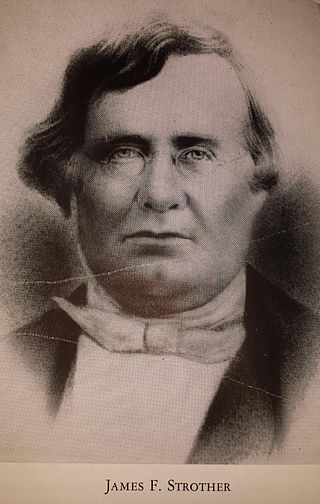
James French Strother was a nineteenth-century American politician and lawyer from a noted Virginia political family of lawyers, military officers and judges. He was the grandson of French Strother who served in the Continental Congress and both houses of the Virginia General Assembly, son of Congressman George Strother and grandfather of Congressman James F. Strother.
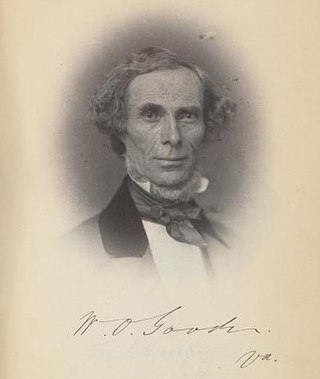
William Osborne Goode was an American politician, slave owner, and lawyer from Virginia.

Samuel Henry Starr was a career United States Army officer, regimental commander and prisoner of war. A collection of his letters provide a rare view of military life, the War with Mexico, Indian conflicts, the Civil War, his fall from grace, recovery and post Civil War service. Despite his rough demeanor he was a religious man and reflective of the times he served.

Charles James Faulkner was a politician, planter, and lawyer from Berkeley County, Virginia who served in both houses of the Virginia General Assembly and as a U.S. Congressman.

Hugh Alfred Garland was an American lawyer and politician. He served in the Virginia House of Delegates. In 1838 to 1841 he served as clerk of the United States House of Representatives. Garland, a slave owner, was a staunch supporter of slavery in the United States, and he led the defense for Dred Scott's owner, John F. A. Sanford, in the case of Dred Scott v. Sandford, but died three years before the case was argued before the United States Supreme Court.
References
- ↑ "Thomas B. Randolph" . Retrieved 2014-01-30.
- ↑ Thomas Patrick Hughes; Frank Munsell (1893). American Ancestry: Embracing lineages from the whole of the United States. p. 221.
- ↑ William Garrett Piston; Richard W. Hatcher (2000). Wilson's Creek: The Second Battle of the Civil War and the Men Who Fought It . The University of North Carolina Press. pp. 37.
